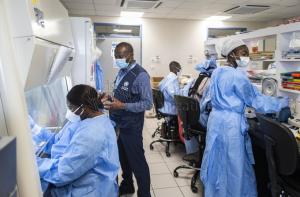Department for International Development -Foreign Commonwealth Development Office (DFID-FDCO) supports the strengthening of COVID-19 response in Ghana
COVID-19, a disease caused by the SARS coronavirus-2 was declared a pandemic by the World Health Organization (WHO) on March 11, 2020., Ghana recorded its first two cases on March 12, 2020. As at November 1 2020, Ghana had recorded 48, 643 confirmed cases with 320 deaths.
The Government of Ghana, under the strong leadership and commitment of the President, His excellency, Nana Addo Dankwa Akufo-Addo, responded quickly by instituting public health and social measures. Key among these public health measures was the strategy of ‘Trace, Test and Treat’ aimed at controlling the pandemic.
Prompt diagnosis of infected persons through testing is crucial in management and policy decisions and forms a key component in Ghana’s COVID-19 Strategic Response Plan. The WHO through funding by the government of the United Kingdom (Department for International Development now part of Foreign Commonwealth Development Office) provided essential laboratory equipment, reagents, test and sample collection kits to boost the diagnostic capacity of the country. At a time when most African countries were battling with how to conduct COVID-19 PCR testing Ghana had famously become known for its ‘pooling strategy’ to COVID-19 testing. Currently, the country can boast of 17 sites with capacity to conduct COVID-19 PCR testing. This support has markedly improved the testing capacity and turnaround time for COVID-19 testing. As at November 12020, 541,153 tests had been conducted, making Ghana one of the countries in the WHO Africa region with the most tests per 100,000 population.
Currently, there is no known treatment or cure for COVID-19, management is mostly supportive and hence safe and timely care for patients is critical to reducing fatalities especially in severe and critical cases. Having standard protocols/guidelines and team adequately trained in the management of COVID-19 cases contributes to improved outcomes. With funding from DFID, the WHO provided technical and financial support in the development of Ghana’s COVID-19 Case Management Manual. 1000 copies of these manuals have been printed and presented to the Ghana Health Service. 2000 more copies are being printed for presentation to the GHS. This manual has provided the framework of knowledge, competencies and best practices in the effective management of COVID-19 cases and possibly impacting on the low number of mortalities recorded in Ghana.
Funding was also provided to the National Case Management team to conduct training of health staff in treatment/isolation centers in six high burden regions on the clinical management of COVID-19 cases and effective follow-up of patients under homecare. In all, 360 health staff have been equipped with capacity to manage COVID-19 cases in Greater Accra, Ashanti, Eastern, Central, Western North and Volta regions.
Given that the majority of infected persons are asymptomatic and transmission of the virus is silent, healthcare workers are at higher risk of contracting the coronavirus in their daily routine or whiles caring for COVID-19 cases. It is therefore important to reduce and mitigate their risk through appropriate education on Infection Prevention and Control in the context of COVID-19. Since the outbreak, Greater Accra region has consistently had the highest burden of COVID-19 cases. The WHO through funding from the DFID, provided financial and technical support to the Greater Accra Regional Health Directorate to train health staff in health facilities in districts within Greater Accra most affected by COVID-19 on Infection Prevention and Control practices related to COVID-19. As a result of this support, 40 clinical staff have been trained as trainer of trainers to cascade the knowledge acquired within their facilities. A further 1,922 clinical staff and 806 non-clinical staff across the different levels of healthcare facilities have developed capacity and skills to practice and implement effective IPC measures to minimize the risk of transmission of coronavirus.
To reduce the socio-economic impact of COVID-19, the government of Ghana has embarked on a phased lifting of the social measures initially instituted. This has led to the re-opening of Ghana’s Kotoka International Airport on September 1, 2020. In anticipation of re-opening of the remaining Points of Entry (PoEs), the WHO with funding from DFID is providing technical and financial support to the Ghana Health Service to develop Public Health Emergency Contingency Plans, train staff at the various WHO designated PoEs, engage in education and sensitization on COVID-19 for communities around these PoEs with the aim of reducing the risk of importation of cases and propagation of community transmission.
Although a lot has been invested in Ghana’s fight against COVID-19, more strategies and funds are needed in the area of risk communication to ensure that the successes gained are sustained.
WHO’s support in timely confirmation of COVID-19 cases, provision of care and reduction in transmission of coronavirus through IPC trainings were all made possible through the Department for International Development with funding from the Government of the United Kingdom.



